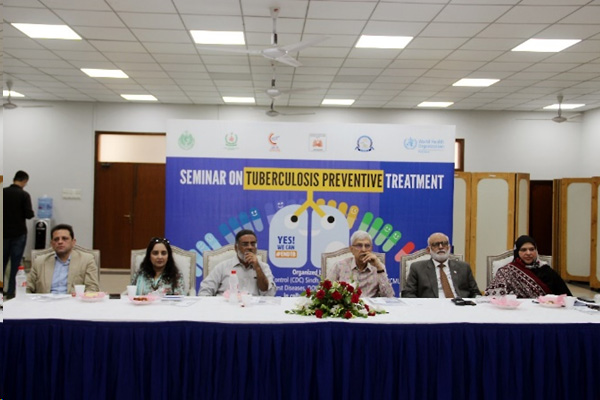 16 October 2024, Karachi, Pakistan – WHO, in collaboration with the Ojha Institute of Chest Diseases, Dow University of Health Sciences (DUHS), the Communicable Disease Control unit at the Department of Health, Sindh (CDC Sindh) and the Ministry of National Health Services, Regulations and Coordination’s Common Management Unit (CMU), organized a seminar on 3 October 2024 focusing on TB preventive treatment (TPT) during which the latest WHO guidance was discussed.
16 October 2024, Karachi, Pakistan – WHO, in collaboration with the Ojha Institute of Chest Diseases, Dow University of Health Sciences (DUHS), the Communicable Disease Control unit at the Department of Health, Sindh (CDC Sindh) and the Ministry of National Health Services, Regulations and Coordination’s Common Management Unit (CMU), organized a seminar on 3 October 2024 focusing on TB preventive treatment (TPT) during which the latest WHO guidance was discussed.
TPT aims to reduce the global incidence of TB and WHO is supporting countries as they address local operational challenges.
Fifty participants attended the hybrid seminar in person, including chest specialists, public health managers from the provinces and CMU, and academics, and 70 joined online, including representatives from JSI, Greenstar, Médecins Sans Frontières, Aga Khan University, Sindh Institute of Urology and Transplantation, the Indus and OMI hospitals and Mercy Corps.
DUHS Vice Chancellor Professor Mohammad Saeed Quraishy and CDC Sindh Deputy Director-General Dr Zulfiqar Dharejo co-chaired the session which was attended by WHO National Professional Officer (TB) Dr Khawaja Laeeq Ahmad, Head of WHO Sub-office Sindh Dr Sara Salman and Deputy National Coordinator CMU (TB) Dr Faisal Siraj.
Medical Officer for Prevention, Research and Innovations at the TB Prevention, Treatment, Care and Innovation Unit of WHO Global Tuberculosis Programme Dr Avinash Kanchar, and Medical Officer at the TB Unit, WHO Regional Office for the Eastern Mediterranean Dr Santosha Kelamane joined the online sessions and facilitated the discussions, highlighting core elements of TPT before responding to audience questions.
Ending the TB epidemic by 2030 is among the Sustainable Development Goals’ health targets. WHO works closely with countries, partners and civil society to scale up the TB response and provides global leadership to end TB through strategy development and political and multisectoral engagement, strengthening accountability, advocacy and partnerships, including with civil society.




